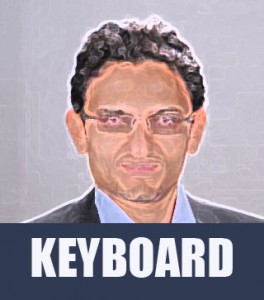Shepard Fairey
Apr 29th, 2011 by Lisa Jacobs
Wael Ghomin isn’t sure he’s a political figure. But hundreds of thousands of Egyptians want desperately to make him one. According to the Los Angeles Times, the Google executive’s 12 days in captivity and his online opposition to dictator Mubarak has made him “temporarily, at least, into an icon of Egyptian resistance.
I chose to position Ghomin in the traditional Obama Hope pose. I would have liked to have given him more of a posertized treatement using Shepard’s reds and oranges instead of the Obama blues and reds. Ideally, I also would have added traditional Egypitan patterns peeking through transparent layers of Shepard Fairey rays of sunshine. Ghomin’s prompting of “This is the time to leave the keyboards and go to the real battle” tells the full story of Internet fueled revolution.
Fair use is a tricky subject. It’s a dilemma that sits squarely at the crossroads of academia and commercialization. For to protect our intellectual property, surely, we must clamp down on rampant copying and raping another’s idea. Yet, we are involved in an information explosion like none other and the remixing, rehashing and recycling of ideas is exciting and transcendent and can take humans to another level. I believe at its heart is an important issue of authenticity and verification that must be answered. We must make strides to be certain that information is true and real and yet encourage creativity. I fall down on the side of citation being critical and hopefully students everywhere are being taught how to do this in the Internet age. Of course, as creativity gets the best of us and we beg, borrow and “steal” from other sources, not remembering to leave bread crumbs as we iterate, then, all we have to go on is intent.

